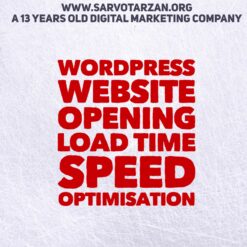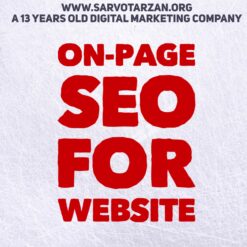Marketing
Is Lead Generation a “Horror Game” for you? Not any more. Read On!
What is Lead generation?
Lead generation is the process of identifying and cultivating potential customers for a business’s products or services. This can be done through a variety of methods, such as online advertising, social media marketing, email marketing, content marketing, and search engine optimization (SEO). The goal of lead generation is to generate a list of qualified leads that can be nurtured and converted into paying customers.
How to generate sales?
Generating sales is the process of converting leads into paying customers. This can be done through a variety of methods, including:
Personal selling: This involves face-to-face or over-the-phone interactions with leads to persuade them to make a purchase.
Marketing: This includes advertising, promotions, and public relations efforts to create awareness and interest in a product or service.
Sales enablement: This involves providing salespeople with the resources and tools they need to effectively sell a product or service.
Sales process: A well-defined and optimized sales process can help increase the chances of converting leads into customers.
Customer service: Providing excellent customer service can help retain customers and increase the chances of repeat sales.
Marketing Automation: Platforms and software to automate repetitive tasks and manage leads, nurturing them through the funnel until they are ready to buy.
Overall, generating sales requires a combination of effective marketing and sales strategies, as well as a focus on providing excellent customer service.
What are lead generation companies?
Lead generation companies are businesses that specialize in identifying and cultivating potential customers for other companies. They use a variety of methods, such as online advertising, social media marketing, email marketing, content marketing, and search engine optimization (SEO) to generate leads for their clients. Some lead generation companies also offer additional services, such as lead nurturing, lead qualification, and sales support.
Examples of lead generation companies include:
Keep in mind that not all lead generation companies are created equal, and it’s important to do your research and find a reputable company that has experience in your industry and can deliver the types of leads you need.
Sarvotarzan
LeadSquared
Callbox
UpLead
Marketo
Lead Forensics
Leadformly
Leadfeeder
LeadGenius
ZoomInfo
What is b2b lead generation?
B2B (business-to-business) lead generation is the process of identifying and cultivating potential customers for a business that sells products or services to other businesses. This is different from B2C (business-to-consumer) lead generation, which focuses on selling products or services to individual consumers.
B2B lead generation often requires a more targeted approach and a deeper understanding of the target market, as businesses tend to have more specific needs and requirements compared to individual consumers. Some common methods of B2B lead generation include:
Content Marketing: Creating valuable and educational content that addresses the needs and challenges of the target market and positions the business as a thought leader in its industry.
Account-Based Marketing (ABM): A targeted approach to lead generation that focuses on a specific set of high-value target accounts.
Webinars and events: Hosting events and webinars to educate and engage potential customers, build relationships, and generate leads.
Email Marketing: Reaching out to potential customers through targeted email campaigns to build relationships and generate leads.
LinkedIn: Using LinkedIn’s advanced targeting and advertising capabilities to reach potential customers and generate leads in a B2B setting.
Referral marketing: Encouraging current customers to refer new business to the company.
Successful B2B lead generation requires a comprehensive and multi-channel approach, as well as a deep understanding of the target market and its specific needs.
How to find real estate leads?
Real estate leads refer to potential homebuyers or sellers who have shown interest in a real estate agent’s services. Generating real estate leads is a crucial part of a real estate agent’s business, as it helps them find new clients and grow their business.
There are many ways to generate real estate leads, including:
Online advertising: Utilizing online advertising platforms such as Google Ads and Facebook Ads to reach potential leads.
Social media marketing: Using social media platforms such as Facebook, Instagram, and LinkedIn to reach and engage with potential leads.
Open houses: Holding open houses for properties for sale to attract potential leads and showcase the agent’s expertise.
Referral marketing: Encouraging current clients to refer friends and family who may be in the market to buy or sell a home.
Networking: Building relationships with other real estate professionals, such as mortgage brokers and home inspectors, to gain referrals and generate leads.
Content marketing: Creating valuable and educational content, such as blog posts and videos, to attract and engage potential leads.
Email marketing: Sending targeted email campaigns to potential leads to build relationships and generate interest in the agent’s services.
It’s important for real estate agents to use a combination of lead generation methods to reach and engage with a diverse group of potential leads.
How to do LinkedIn lead generation?
LinkedIn lead generation is the process of using LinkedIn, a professional networking platform, to identify and cultivate potential customers for a business. LinkedIn is a powerful tool for B2B lead generation, as it allows businesses to connect with a large and targeted audience of professionals and decision-makers.
Some ways to generate leads on LinkedIn include:
Company page optimization: Ensuring that your company’s LinkedIn page is optimized for search and accurately reflects your brand and offerings.
LinkedIn advertising: Using LinkedIn’s advanced targeting and advertising capabilities to reach potential customers and generate leads.
LinkedIn groups: Joining and actively participating in LinkedIn groups related to your industry or target market to connect with potential leads.
Content marketing: Sharing valuable and educational content on LinkedIn to attract and engage potential leads.
Personal branding: Building a strong personal brand on LinkedIn by regularly posting updates, participating in discussions, and connecting with others in your network.
InMail: Sending direct messages to potential leads through LinkedIn’s InMail feature to introduce yourself and your business.
Lead generation forms: Adding lead generation forms to your LinkedIn posts to make it easy for potential leads to express interest in your products or services.
By utilizing a combination of these tactics, businesses can effectively use LinkedIn for lead generation and connect with potential customers in a professional and targeted manner.
What are mortgage leads?
Mortgage leads refer to potential homebuyers or refinance clients who have shown interest in obtaining a mortgage loan. Generating mortgage leads is an important part of a mortgage loan officer’s business, as it helps them find new clients and grow their business.
There are many ways to generate mortgage leads, including:
Online advertising: Utilizing online advertising platforms such as Google Ads and Facebook Ads to reach potential leads.
Social media marketing: Using social media platforms such as Facebook, Instagram, and LinkedIn to reach and engage with potential leads.
Referral marketing: Encouraging current clients to refer friends and family who may be in the market for a mortgage loan.
Networking: Building relationships with other professionals in the real estate and finance industries to gain referrals and generate leads.
Content marketing: Creating valuable and educational content, such as blog posts and videos, to attract and engage potential leads.
Email marketing: Sending targeted email campaigns to potential leads to build relationships and generate interest in the loan officer’s services.
Direct mail: Sending targeted direct mail campaigns to potential leads to build awareness and generate interest in the loan officer’s services.
It’s important for mortgage loan officers to use a combination of lead generation methods to reach and engage with a diverse group of potential leads. By doing so, they can effectively generate and nurture mortgage leads and grow their business.
What are business leads?
Business leads refer to potential customers or clients who have shown interest in a business’s products or services. Generating business leads is a crucial part of any business, as it helps the company find new customers and grow their business.
There are many ways to generate business leads, including:
Online advertising: Utilizing online advertising platforms such as Google Ads and Facebook Ads to reach potential leads.
Social media marketing: Using social media platforms such as Facebook, Instagram, and LinkedIn to reach and engage with potential leads.
Content marketing: Creating valuable and educational content, such as blog posts and videos, to attract and engage potential leads.
Email marketing: Sending targeted email campaigns to potential leads to build relationships and generate interest in the business’s products or services.
Referral marketing: Encouraging current customers to refer friends and family who may be in the market for the business’s products or services.
Trade shows and events: Participating in trade shows and events related to the industry to network and connect with potential leads.
Search engine optimization (SEO): Improving the visibility of the business’s website in search engine results pages to attract potential leads.
It’s important for businesses to use a combination of lead generation methods to reach and engage with a diverse group of potential leads. By doing so, they can effectively generate and nurture business leads and grow their customer base.
What is a lead funnel?
A lead funnel is a multi-step process used to guide potential customers through the journey of becoming a paying customer. The lead funnel consists of several stages, including attracting leads, nurturing leads, and converting leads into customers.
The typical stages of a lead funnel are:
Awareness: This is the first stage of the lead funnel, where potential leads become aware of the business and its products or services. This is often achieved through online advertising, content marketing, and social media marketing.
Interest: In this stage, potential leads begin to show interest in the business and its offerings. They may request more information or sign up for a newsletter.
Evaluation: In this stage, potential leads evaluate the business and its offerings to determine if they are a good fit for their needs. This is where lead nurturing comes into play, as businesses use targeted messaging and content to educate and engage with potential leads.
Decision: In this stage, potential leads make a decision to either become a customer or not. If they decide to become a customer, they will typically complete a purchase or sign up for a service.
Loyalty: In this final stage, customers become loyal customers and may make repeat purchases or refer friends and family to the business.
By effectively guiding potential customers through the lead funnel, businesses can convert more leads into customers and grow their business. It’s important for businesses to continually evaluate and optimize their lead funnel to ensure that it is effectively attracting, nurturing, and converting leads.
Should you be buying leads real estate?
Buying leads in real estate refers to purchasing a list of potential homebuyers or sellers from a lead generation company. This can be an effective way for real estate agents to quickly acquire a large number of leads, however, the quality of the leads can vary and may require significant time and effort to nurture.
When buying real estate leads, it’s important to consider several factors, including:
Lead quality: The quality of the leads can vary greatly, so it’s important to choose a lead generation company that has a proven track record of delivering high-quality leads.
Cost: Lead generation companies typically charge a fee for their leads, so it’s important to carefully evaluate the cost versus the potential return on investment.
Lead volume: The number of leads included in a lead generation package can vary, so it’s important to choose a package that offers enough leads to make the investment worthwhile.
Lead exclusivity: Some lead generation companies offer exclusive leads, meaning that only one agent has access to a particular lead. This can be more expensive but may result in a higher conversion rate.
Lead responsiveness: The responsiveness of the leads can vary, so it’s important to choose a lead generation company that has a proven track record of delivering leads that are interested in what the real estate agent has to offer.
By carefully evaluating these factors, real estate agents can make an informed decision about whether buying leads is a good fit for their business. However, it’s important to note that buying leads is just one of many ways to generate leads in real estate, and it may be more effective to utilize a combination of lead generation methods to reach and engage with a diverse group of potential leads.
What are listing leads?
Listing leads refer to potential clients who are interested in listing their property for sale with a real estate agent. Listing leads can be generated in a variety of ways, including:
Online advertising: Utilizing online advertising platforms such as Google Ads and Facebook Ads to reach potential leads who are interested in selling their property.
Social media marketing: Using social media platforms such as Facebook, Instagram, and LinkedIn to reach and engage with potential leads who are interested in selling their property.
Content marketing: Creating valuable and educational content, such as blog posts and videos, to attract and engage potential leads who are interested in selling their property.
Email marketing: Sending targeted email campaigns to potential leads who are interested in selling their property to build relationships and generate interest in the real estate agent’s services.
Referral marketing: Encouraging current clients to refer friends and family who may be interested in selling their property.
Open houses: Hosting open houses for properties that are already listed for sale, which can attract potential leads who are interested in selling their property.
Networking: Building relationships with other real estate professionals, such as mortgage brokers and home inspectors, who may have clients who are interested in selling their property.
By effectively generating and nurturing listing leads, real estate agents can increase their chances of obtaining new listings and growing their business. It’s important for real estate agents to use a combination of lead generation methods to reach and engage with a diverse group of potential leads, and to continually evaluate and optimize their lead generation strategy to ensure that it is effectively attracting and converting leads.
How to generate leads with email marketing?
Email marketing is one of the most effective ways to generate leads. It’s simple, it’s affordable, and it can be automated. The only downside is that you need to have a good plan and know how to use email marketing tools. That’s where our email lead generation guide comes in. We’ll show you how to create an email campaign that will generate leads and make your business more efficient.
Why You Should Use Email Marketing to Generate Leads.
Email marketing is a great way to generate leads. By sending out newsletters and offers to potential customers, you can build relationships with them and bring in new customers. This type of marketing can be very useful in building customer loyalty and generating sales.
How to Use Email Marketing to Generate Leads.
In order to use email marketing effectively, you need to be able to understand it properly. Email marketing is all about creating a message that will resonate with your target audience and encourage them to act on your behalf. You do this by designing an email that is interesting, informative, and persuasive. You also need to make sure the email is marked as spam-free, so that people who might not want to receive it are dissuaded from clicking it.
How to Get Started in Email Marketing.
If you’re just getting started in email marketing, there are a few things you need to do before starting any campaigns. In this section, we’ll outline the basics of what email marketing is and how to get started.
Once you have a basic understanding of email marketing, you can start exploring different ways to generate leads and increase your lead flow. Additionally, learn how to use email marketing to generate leads for your business or organization. Finally, in this section, we will provide some tips on improving your email marketing strategy so that your campaigns are more effective and successful.
Increase Your Leads Flow.
The first step in increasing your leads flow is creating an effective plan. By creating a comprehensive plan that takes into account all of your goals and objectives, you can ensure that your emails reach as many people as possible while minimizing the risk of losing potential customers or followers. Additionally, by focusing on content that is interesting and relevant to their needs, you can drive traffic away from competitors who may be trying to attract those same customers with less quality content.
Improve Your Email Marketing Strategy.
Email marketing is all about targeting potential customers according to their interests and needs. In order to achieve the most success with email marketing, it’s important to know what kinds of content To target and when to send them it (or not). Additionally, it’s important never forget about the “rules of engagement” – always remember that proper etiquette when sending Emails (and other forms of communication) should be followed at all times! In addition, by following these rules (and others like them), you will help keep your customer base engaged longer term and increase the chances they will convert into buyers or subscribers.
Tips for Successful Email Marketing.
Email marketing is an effective way to reach potential customers. However, there are a few things you can do to make sure your email campaigns are effective and that your messages reach the right people.
One important thing to keep in mind is to use the right message for the right audience. Too often, people receive email campaigns that are too general or vague. This can actually attract too many unqualified leads, which could cost you lots of business.
To be most effective, email campaigns need to focus on specific topics or interests. It’s also important to tailor your messages according to the type of person you’re trying to reach – for example, if you’re targeting entrepreneurs or small businesses, you might want to focus on more technical content instead of fluffy stories about how great your product is.
Finally, remember that email marketing is an interactive medium – be sure to include questions and feedback points in your emails so potential customers can get more information and advice from you. This will help ensure that your messages are tailored specifically for each individual customer and that they feel like they’re being treated as a valued client rather than just a number.
Conclusion
Email marketing can be a powerful tool for generating leads. By using the right message, technique, and situation, you can increase your lead flow and improve your email marketing strategy. With effective email marketing, you can reach a larger audience and boost sales. To get started, learn how to use email marketing to generate leads in a basic plan and improve your strategy. Finally, learn tips for success so that you can achieve success in email marketing.

 Buy Website Optimisation Service of Website Speed, Page Speed Score, Y-Slow Score, Fully Loaded Time
Buy Website Optimisation Service of Website Speed, Page Speed Score, Y-Slow Score, Fully Loaded Time  Buy On Page SEO Service
Buy On Page SEO Service 